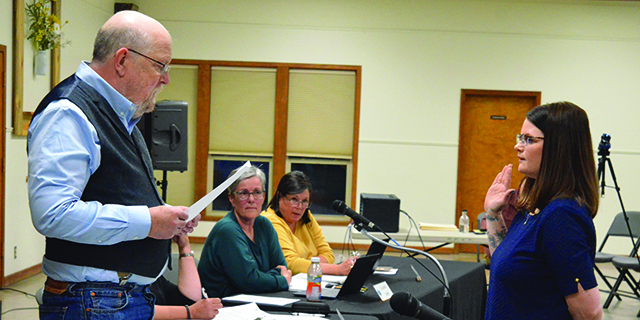Federal civil rights claim can proceed against ex-Umatilla police sergeant in botched sexual assault investigation
Published 9:00 am Sunday, October 22, 2023

- The federal courthouse in Pendleton was the site of a hearing July 14, 2023, in the lawsuit against a former Umatilla Police Department sergeant, current police administrators and the city for failing to investigate the sexual assault of a 13-year-old girl in 2018. U.S. Magistrate Judge Andrew Hallman ruled Monday, Oct. 16, the discrimination claim can go to trial and former Sgt. Bill Wright does not have qualified immunity, but Hallman dismissed claims against the city of Umatilla and police Chief Darla Huxel and Lt. Keith Kennedy.
UMATILLA — A federal civil rights claim can proceed against a former Umatilla police sergeant accused of failing to do much of anything to investigate the sexual assault of a 13-year-old girl because of her gender.
U.S. Magistrate Judge Andrew Hallman ruled Monday, Oct. 16, the discrimination claim can go to trial and former Sgt. Bill Wright isn’t protected at this stage in the case by qualified immunity.
Wright sought protection under the 50-year-old legal doctrine established by the U.S. Supreme Court to safeguard government employees from frivolous litigation. It often has been used to shield police in civil suits.
Hallman said police are aware they cannot deny service to anyone based on a discriminatory motive.
“The relevant question is whether it was clearly established that it is unconstitutional for a police officer to fail to investigate a report of sexual assault because of the gender of the victim. This Court concludes that it was,” Hallman wrote.
Hallman, though, dismissed other due process and negligence claims against Wright. He also dismissed discrimination, negligence and due process claims against the city of Umatilla and two of Wright’s police supervisors, Chief Darla Huxel and Lt. Keith Kennedy.
The 13-year-old was sexually assaulted by a Florida man, who groomed her for months online before flying to Hermiston in March 2018. He picked her up from her house in the middle of the night, drove her to a hotel, assaulted her and secretly filmed the abuse, according to testimony during the man’s federal criminal trial.
In sworn testimony during the trial, Wright revealed how little he did to investigate the sexual assault, according to a court transcript.
Wright told the girl’s parents he didn’t believe their daughter and directed her mother to find out the full name of the attacker. He failed to do basic investigative work, such as discovering who reserved the hotel room where the assault occurred, according to testimony and the girl’s attorneys.
The FBI eventually conducted a proper investigation, which led to the arrest and conviction of Michael Wayne Lyon.
Lyon had used his real name and correct birthdate on the car rental paperwork and hotel room reservation, trial testimony showed. He was sentenced to 25 years in federal prison.
In the civil suit, Hallman found Wright’s supervisors can’t be held liable for depriving the girl of her right to equal protection under the law because the complaint doesn’t show they were “personally involved” in the alleged civil rights violation. If new information develops as the case proceeds, claims against the supervisors could be added back, the judge ruled.
Wright’s lawyer, Andrew D. Campbell, argued in court the victim’s lawyers must show Wright treated the girl differently than another group, such as boys who have made similar sexual assault allegations.
“If taken as true, these allegations indicate that Wright performed substandard police work, but it says nothing about unequal treatment” because the claim doesn’t allege another group of people similarly situated received better treatment, Campbell said.
But the judge rejected Campbell’s argument.
Citing 9th U.S Circuit Court of Appeals case law, Hallman wrote the “existence of a comparator is not a prerequisite to stating a disparate treatment claim under the Fourteenth Amendment.”
Lawyers for the girl, now 18, said they don’t need to show comparative cases if they have direct or circumstantial evidence that discrimination “more than likely” motivated Wright.
Not believing the girl “based on an animus towards women is the crux” of her case, said Terry Scannell, one of her attorneys.
According to her lawyers, Wright told her parents: “Young girls make stuff up like this all the time” and “girls this age withhold information.”
Wright also told them, according to the lawyers, the girl was “just upset at a boy and trying to get back at him” and asked: “How do we know she is still not lying?” and “How do we know we are not ruining some guy’s life because she is still mad?”
After the girl and her father first went to Umatilla police to report the assault, Wright talked to the girl “probably 10 minutes or less,” he testified at the criminal trial.
He wrote a brief report and referred her to Guardian Care Center, a local agency that investigates child abuse, for another interview. He assured the girl’s father that a full investigation would be done.
Two days later, the girl and her mother returned to police and provided Wright with a recording of the video of the assault, which her attacker had shared with the girl’s brother and a friend.
At that meeting, Wright remarked how calm the girl was and suggested she might be “just upset at a boy and trying to get back at him,” the civil suit alleges.
Wright never went to the Comfort Inn & Suites in Hermiston where the sexual assault took place, never asked for information on who registered to rent the room and relied on the Comfort Inn manager to review any video from the hotel. He never asked for a copy of the hotel’s surveillance video and never sought a search warrant to review the girl’s social-media exchanges with the suspect.
Wright failed to do any investigative work even when he was given a photo of the suspect and video evidence of the crime being committed, removing the classic “he said/she said” issue in sexual assault cases, Scannell argued. Wright also didn’t send the case to the district attorney for review.
In the city’s case, the judge said the lawsuit failed to show Umatilla had a practice of discriminating against female victims of sexual assault. He dismissed the city from the case but said the equal protection claim can be revived with new evidence.
The judge also threw out negligence claims against Wright and the city because Doe’s lawyers failed to show that a “special relationship” existed between the police sergeant and the victim of the sexual assault, or that Wright’s actions caused any “physical injury” to the girl.
She had sought emotional distress and general compensatory damages, but under Oregon’s “economic loss doctrine,” she must show a physical injury, loss or harm to recover for economic losses, or that a special relationship existed between the sergeant and herself as a crime victim, the judge found.
“There is no plausible basis to conclude Wright’s alleged negligence had ‘a perceptible physical effect’ on Plaintiff or that ‘she suffered a physical touching’ as a result of Wright’s negligence,” the opinion said. The relationship involving a police officer and a crime victim also does not rise to a “special relationship,” recognized by case law under the state negligence statute, the judge also found.
Even so, Hallman chastised the city and Wright’s supervisors during a July hearing on their motions to dismiss.
“When I read this complaint, even if I said everything is true, what it seems like is you had a city and supervisors just asleep at the wheel, while an individual was just not doing his job and behaving discriminatorily,” Hallman said during the hearing.
In his opinion, the judge also referenced Wright’s mishandling of another girl’s reported sexual assault.
In April 2022, Umatilla police received a report that another girl had been sexually assaulted on a school trip to Houston, Texas, by an 18-year-old student.
Wright declined to conduct an interview or take a statement in the case until after he referred the girl to the Guardian Care Center and then told her parents he would send a report to Houston police, who would decide whether to prosecute, the judge wrote in his ruling.
The girl’s mother also asked Wright to investigate an incident from December 2021 in which she said the same 18-year-old male student had grabbed her daughter’s breast at school, according to the ruling.
Wright replied, “We can look into that, but what else is there? There is not much there. He didn’t break any laws,” the suit alleged.
Disturbed by the sergeant’s remark, the girl’s father told Wright, “You don’t believe these girls,” Hallman recounted in his opinion.
The girl’s mother subsequently couldn’t get a copy of Wright’s investigative report from police or the district attorney and learned from Houston police that they had no contact with Umatilla police about her daughter’s case, the judge noted.
When Houston police finally received something from Umatilla police, they said they couldn’t bring charges “as a result of UPD handling the investigation so poorly,” Hallman wrote.
Wright resigned from Umatilla Police Department this past March, two weeks after The Oregonian/OregonLive disclosed the lackluster police inquiry into the 13-year-old’s case and that he had been named in a civil rights suit.
Wright, 59, had worked at the 13-member department for more than 30 years.
His resignation is under review by the state Department of Public Safety Standards and Training’s professional standards program, according to a department spokeswoman Rebecca Hannon.





